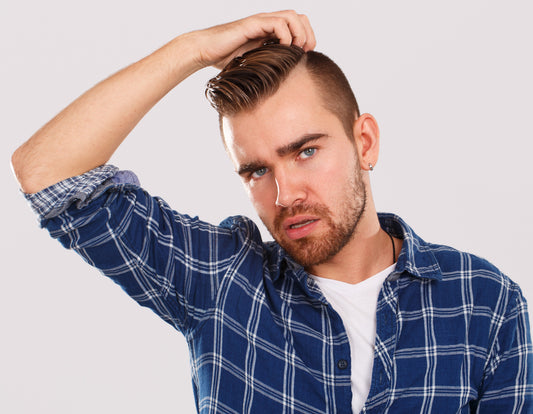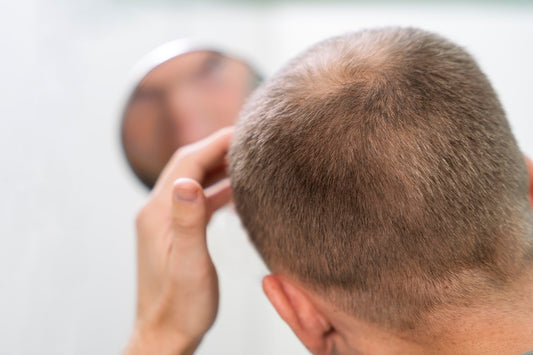Understanding the science behind hair growth is essential for achieving healthy, strong, and vibrant locks. This comprehensive guide will delve into how hair grows, the factors affecting hair growth, what promotes healthy hair, and what can hinder hair growth.
By learning more about hair biology, you can make informed decisions on lifestyle choices, nutrition, and hair care practices that cater to your hair's unique needs.
Hair Biology: Structure and Growth
Hair is a complex structure made up of many structures and cells. The hair shaft is composed of three layers: the cuticle, cortex, and medulla. The outer shell of the hair is called the cuticle, which is responsible for protecting your hair from environmental damage as well as providing structural support.
Hair Structure
Hair is primarily composed of a protein called keratin, which plays a significant role in forming the hair fiber's structure. The hair strand consists of three layers:
- Medulla: The innermost layer of the hair shaft, sometimes absent or fragmented in fine hair
- Cortex: The middle layer, consisting mainly of keratin and melanin, which gives hair its strength, elasticity, and color
- Cuticle: The outermost layer, made of flat, overlapping cells that protect the hair shaft
Hair Follicles and the Hair Growth Cycle
Hair originates in the hair follicle, a complex, miniature body organ in the skin's dermis layer. The follicle houses the dermal papilla, which receives blood supply and nutrients, allowing cell division and hair growth to occur.

Hair growth consists of three main phases:
- Anagen (Growth) phase: During the anagen phase, the hair matrix cells in the follicle's base divide rapidly, resulting in new hair growth. This phase, lasting two to seven years, determines hair length.
- Catagen (Transition) phase: This two-to-four-week-long phase marks the end of the anagen phase, during which hair growth ceases, and the hair follicle shrinks and detaches from the dermal papilla.
- Telogen (Resting) phase: The telogen phase, lasting around three months, is a brief resting period before the hair falls out and a new hair starts growing.
As each hair follicle functions independently, it progresses through these phases at its own pace. Generally, 80–90% of your hair follicles remain in the anagen phase, while the rest are in the catagen and telogen phases, resulting in a constant mix of growth and shedding.
Scientific Factors Affecting Healthy Hair Growth
Hair growth is affected by a number of factors, including stress, diet, hormones and genetics. Let's discuss them in detail.
Genetics
Genetics play a crucial role in determining hair growth, color, thickness, and texture. Variations in specific genes can account for differences in hair growth rates and the length of the anagen phase.
Hormones
Hormones are chemical messengers that regulate hair growth. Androgens, such as testosterone and dihydrotestosterone (DHT), affect hair growth by binding to receptors in the hair follicle, either promoting or inhibiting growth.
For example, an overproduction of DHT may lead to hair loss in susceptible individuals.
On the other hand, estrogen hormones extend the anagen phase, leading to fuller, thicker hair. Progesterone also contributes to hair health by balancing hormones and modulating the effects of 5-alpha reductase, the enzyme responsible for converting testosterone to DHT.
Scalp Health
A healthy scalp supports robust hair growth. Proper blood circulation to the scalp ensures that hair follicles receive adequate nutrients and oxygen.

Scalp conditions, such as dandruff, seborrheic dermatitis, psoriasis, and eczema, can negatively impact the hair follicle and impair hair growth.
Nutrition
Your diet greatly affects the quality of your hair. An insufficient intake of essential nutrients can result in hair loss and slow hair growth. Nutrients crucial for hair health include:
- Protein: Hair is predominantly protein, making sufficient protein intake paramount for hair growth.
- Vitamins: Biotin (vitamin B7), niacin (vitamin B3), riboflavin (vitamin B2), pantothenic acid (vitamin B5), vitamin A, vitamin C, and vitamin D play vital roles in hair health.
- Minerals: Zinc, selenium, iron, and magnesium aid in various hair-growth processes.
Environmental Factors
Environmental factors, such as UV radiation from sunlight, air pollution, humidity, and temperature, can harm the hair shaft's integrity and hinder hair growth. For example, prolonged UV exposure weakens the protective cuticle, leading to dry and brittle hair.
Hair Care Practices
Your hair care routine can either hamper or promote healthy hair growth. Harsh styling practices, such as excessive heat styling, tight hairstyles, over-washing, and the use of harsh chemicals, can weaken the hair shaft, leading to breakage and hair loss.
What Promotes Healthy Hair Growth?
A healthy diet that's rich in essential vitamins and minerals is an essential part of promoting hair growth.
1. Balanced Diet
Maintaining a balanced diet is crucial for hair health as hair cells require a mix of nutrients to grow.

- Proteins: Hair is fundamentally protein. So, a diet rich in high-quality proteins, like lean meats, dairy, eggs, and plant-based proteins, promotes healthy hair growth.
- Vitamins: Key vitamins for hair growth include vitamin A, B-vitamins (including biotin and niacin), vitamin C, vitamin D, and vitamin E. Include fruits, vegetables, and whole grains in your diet to ensure adequate vitamin intake.
- Minerals: Essential minerals for hair health include iron, zinc, and selenium. These can be found in food items like lean meat, seafood, beans, lentils, nuts, and seeds.
- Omega-3 Fatty Acids: These fats promote hair health by nourishing hair follicles. You can boost your intake through fish, avocado, and nuts.
2. Proper Scalp Care
Proper scalp care is as important as a good hair care regimen for ensuring healthy hair growth.
- Regular Washing: Washing hair every 2-3 days allows natural oils to hydrate and protect the hair and scalp.
- Scalp Massage: Gently massaging your scalp regularly with your fingertips or a brush with soft bristles can stimulate blood flow to the scalp and hair follicles, encouraging hair growth.
- Avoid Hot Showers: Hot water can dry out your scalp and hair. Instead, opt for lukewarm or cold water to wash your hair.
- Use of Essential oil: Adding a few drops of essential oils like rosemary, lavender, or peppermint to your shampoo or conditioner can also promote hair health and growth by stimulating blood circulation.
3. Stress Management
High levels of stress can disrupt the normal hair growth cycle, leading to hair loss. Include stress management techniques like yoga, meditation, and regular exercise into your lifestyle to help maintain healthy hair growth.
4. Avoidance of Heat and Chemical Styling
Excessive heat styling or using chemical treatments can damage the hair fiber, leading to hair breakage and loss. Reduce the use of hot styling tools and consider natural styling alternatives.
5. Regular Trimming
Regular trimming helps to avoid split ends and keeps your hair looking healthy and full. While it doesn't directly affect hair growth at the root level, it does prevent hair breakage, maintaining the hair’s appearance and health.

6. Hydration
Staying hydrated is important for hair health. Water helps to keep the hair shaft hydrated from within, supporting hair strength and elasticity. Aim to drink at least 8 glasses of water a day.
7. Adequate Sleep
Sleep is important for cell regeneration, including the cells within your hair follicles. Aim for seven to nine hours of sleep a night for optimal hair health.
Final Words on the Science of Hair Growth
Keeping your hair healthy requires regular care and attention. It's more than just using hair products; your diet, lifestyle habits all play a part too.
Remember, your hair often reflects your overall health and making notable improvements can take some time. But with patience, a balanced diet, good hair care routine, and a healthy lifestyle, you can nurture your hair to grow stronger and healthier.
In search of a simple solution for maintaining rich, glossy, and strong hair? The Mohebi Life Natural Hair Support Supplement for Men has you covered. One capsule daily is your ticket to experiencing the benefits of our scientifically-researched blend.
By harnessing nature's pure materials like saw palmetto and pumpkin seed oil, proven by five independent studies to support hair health, along with advanced scientific research, we aim to boost steady hair growth and enhance your hair's overall health. Start your hair wellness journey with Mohebi Life.
FAQs
Is hair regrowth scientifically possible?
Yes, hair regrowth is scientifically possible. Various treatments, such as topical minoxidil, finasteride, low-level laser therapy, and platelet-rich plasma therapy, have shown effectiveness in scientific studies for promoting hair regrowth.
What is the study of hair growth called?
The study of hair growth is under the field called Trichology, which is a branch of dermatology. Trichology primarily focuses on the scientific study of the hair and scalp.
What stimulates the growth of hair?
Hair growth is stimulated by various factors such as a balanced diet rich in protein, vitamins, and minerals, maintaining a healthy scalp, proper hair care routine, and avoiding damaging hair practices. Certain hormones, like androgens and estrogens, also play a vital role in hair growth.
What are the big 3 for hair regrowth?
The 'Big 3' for hair regrowth typically refers to Minoxidil, Finasteride, and Ketoconazole. They are FDA-approved treatments known to prevent hair loss and promote hair regrowth effectively.
Can onion juice regrow hair?
It depends! Some research suggests that applying onion juice to the scalp can improve hair growth. Onion juice contains high sulfur content, which is believed to increase blood circulation to hair follicles and reduce inflammation, thus promoting hair regrowth.



